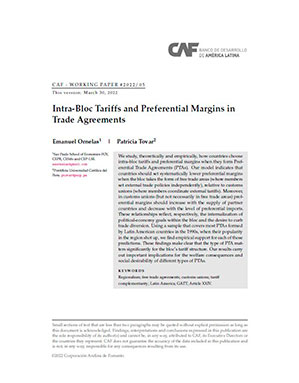Intra-Bloc Tariffs and Preferential Margins in Trade Agreements
Abstract
We study, theoretically and empirically, how countries choose intra-bloc tariffs and preferential margins when they form Preferential Trade Agreements (PTAs). Our model indicates that countries should set systematically lower preferential margins when the bloc takes the form of free trade areas (where members set external trade policies independently), relative to customs unions (where members coordinate external tariffs). Moreover, in customs unions (but not necessarily in free trade areas) preferential margins should increase with the supply of partner countries and decrease with the level of preferential imports. These relationships reflect, respectively, the internalization of political-economy goals within the bloc and the desire to curb trade diversion. Using a sample that covers most PTAs formed by Latin American countries in the 1990s, when their popularity in the region shot up, we find empirical support for each of those predictions. These findings make clear that the type of PTA matters significantly for the bloc’s tariff structure. Our results carry out important implications for the welfare consequences and social desirability of different types of PTAs.
Subject
Country / Region
Date
2022-04-05Cite this publication
Belongs to collection
Author
Ornelas, EmanuelTovar, Patricia


